Case Study on Fiduciary & Director Duties: Blue Pty Ltd Analysis
VerifiedAdded on 2023/06/03
|12
|3824
|140
Case Study
AI Summary
This case study delves into the fiduciary duties and director's responsibilities within Blue Pty Ltd and JVI. It examines potential breaches of these duties by directors Daniel, Sarah, and Melanie, focusing on conflicts of interest, improper loan allocations, and the concealment of financial misappropriation. The analysis covers relevant legal principles, including common law fiduciary duties and statutory obligations under the Corporations Act 2001, specifically sections 180 and 181. Furthermore, the case study explores Gina Gunter's duty of care, potential defenses available to directors, and breaches related to insolvent trading, providing a comprehensive overview of corporate governance and legal compliance issues. Desklib offers a variety of solved assignments and past papers to assist students in their studies.
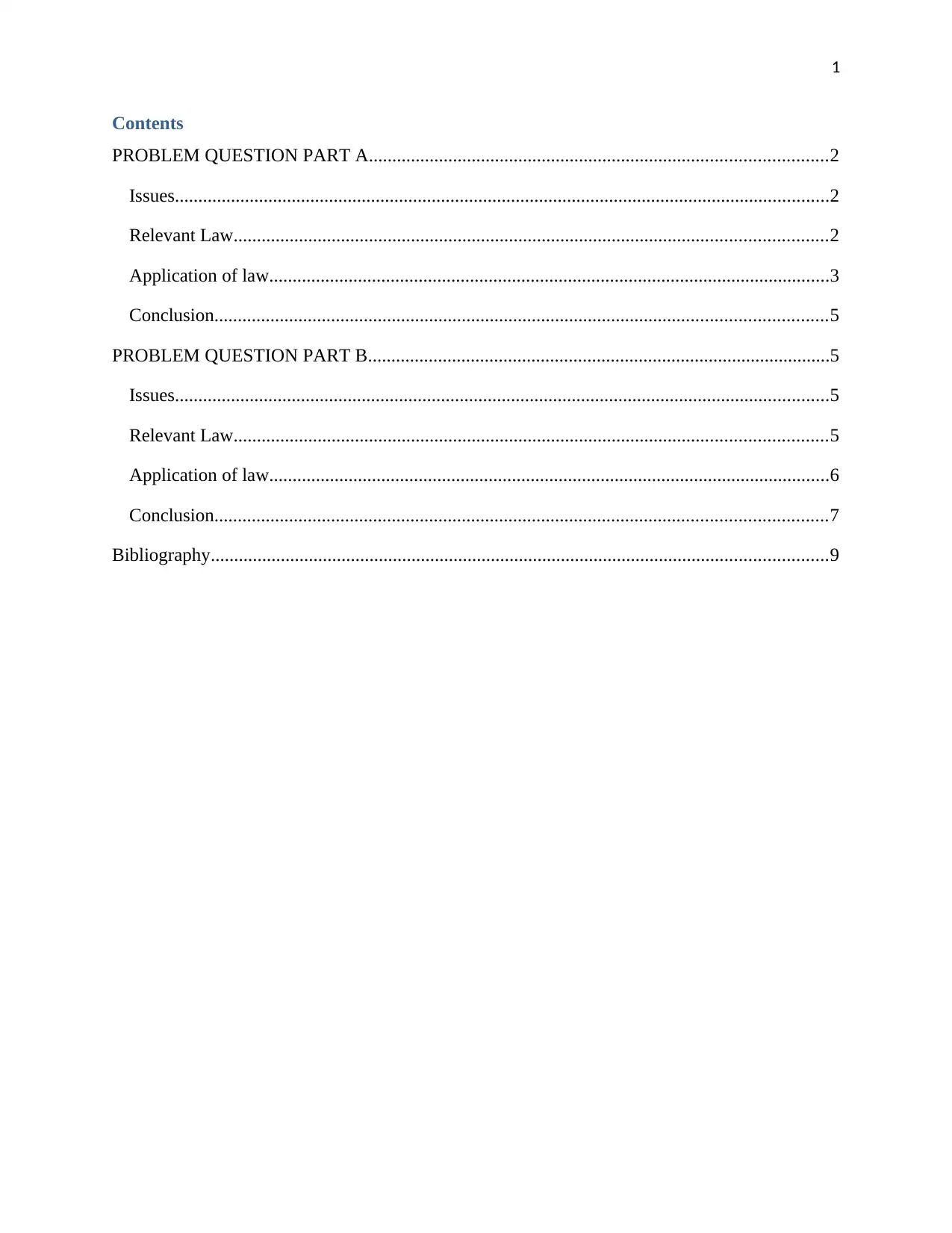
1
Contents
PROBLEM QUESTION PART A..................................................................................................2
Issues............................................................................................................................................2
Relevant Law...............................................................................................................................2
Application of law........................................................................................................................3
Conclusion...................................................................................................................................5
PROBLEM QUESTION PART B...................................................................................................5
Issues............................................................................................................................................5
Relevant Law...............................................................................................................................5
Application of law........................................................................................................................6
Conclusion...................................................................................................................................7
Bibliography....................................................................................................................................9
Contents
PROBLEM QUESTION PART A..................................................................................................2
Issues............................................................................................................................................2
Relevant Law...............................................................................................................................2
Application of law........................................................................................................................3
Conclusion...................................................................................................................................5
PROBLEM QUESTION PART B...................................................................................................5
Issues............................................................................................................................................5
Relevant Law...............................................................................................................................5
Application of law........................................................................................................................6
Conclusion...................................................................................................................................7
Bibliography....................................................................................................................................9
Paraphrase This Document
Need a fresh take? Get an instant paraphrase of this document with our AI Paraphraser
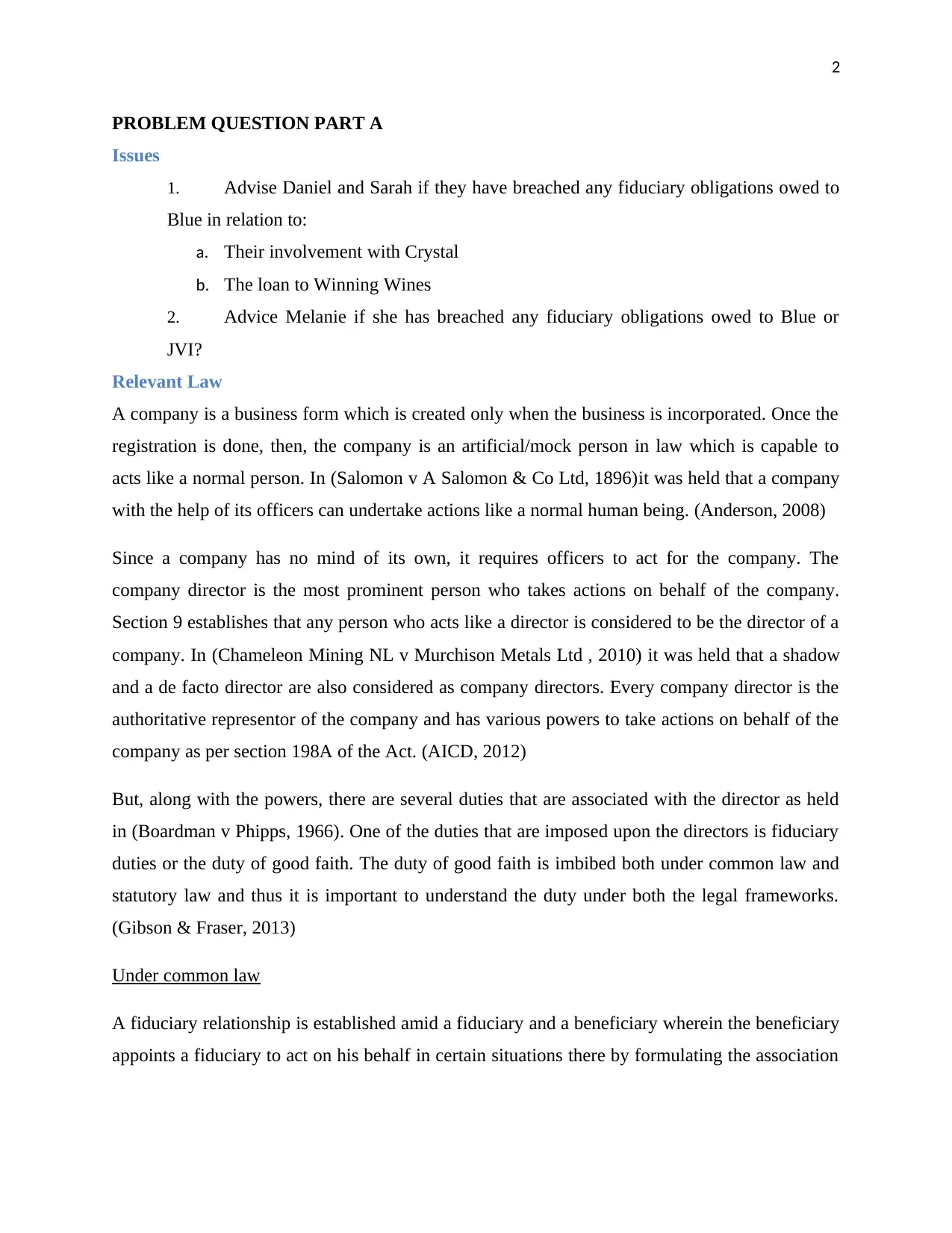
2
PROBLEM QUESTION PART A
Issues
1. Advise Daniel and Sarah if they have breached any fiduciary obligations owed to
Blue in relation to:
a. Their involvement with Crystal
b. The loan to Winning Wines
2. Advice Melanie if she has breached any fiduciary obligations owed to Blue or
JVI?
Relevant Law
A company is a business form which is created only when the business is incorporated. Once the
registration is done, then, the company is an artificial/mock person in law which is capable to
acts like a normal person. In (Salomon v A Salomon & Co Ltd, 1896)it was held that a company
with the help of its officers can undertake actions like a normal human being. (Anderson, 2008)
Since a company has no mind of its own, it requires officers to act for the company. The
company director is the most prominent person who takes actions on behalf of the company.
Section 9 establishes that any person who acts like a director is considered to be the director of a
company. In (Chameleon Mining NL v Murchison Metals Ltd , 2010) it was held that a shadow
and a de facto director are also considered as company directors. Every company director is the
authoritative representor of the company and has various powers to take actions on behalf of the
company as per section 198A of the Act. (AICD, 2012)
But, along with the powers, there are several duties that are associated with the director as held
in (Boardman v Phipps, 1966). One of the duties that are imposed upon the directors is fiduciary
duties or the duty of good faith. The duty of good faith is imbibed both under common law and
statutory law and thus it is important to understand the duty under both the legal frameworks.
(Gibson & Fraser, 2013)
Under common law
A fiduciary relationship is established amid a fiduciary and a beneficiary wherein the beneficiary
appoints a fiduciary to act on his behalf in certain situations there by formulating the association
PROBLEM QUESTION PART A
Issues
1. Advise Daniel and Sarah if they have breached any fiduciary obligations owed to
Blue in relation to:
a. Their involvement with Crystal
b. The loan to Winning Wines
2. Advice Melanie if she has breached any fiduciary obligations owed to Blue or
JVI?
Relevant Law
A company is a business form which is created only when the business is incorporated. Once the
registration is done, then, the company is an artificial/mock person in law which is capable to
acts like a normal person. In (Salomon v A Salomon & Co Ltd, 1896)it was held that a company
with the help of its officers can undertake actions like a normal human being. (Anderson, 2008)
Since a company has no mind of its own, it requires officers to act for the company. The
company director is the most prominent person who takes actions on behalf of the company.
Section 9 establishes that any person who acts like a director is considered to be the director of a
company. In (Chameleon Mining NL v Murchison Metals Ltd , 2010) it was held that a shadow
and a de facto director are also considered as company directors. Every company director is the
authoritative representor of the company and has various powers to take actions on behalf of the
company as per section 198A of the Act. (AICD, 2012)
But, along with the powers, there are several duties that are associated with the director as held
in (Boardman v Phipps, 1966). One of the duties that are imposed upon the directors is fiduciary
duties or the duty of good faith. The duty of good faith is imbibed both under common law and
statutory law and thus it is important to understand the duty under both the legal frameworks.
(Gibson & Fraser, 2013)
Under common law
A fiduciary relationship is established amid a fiduciary and a beneficiary wherein the beneficiary
appoints a fiduciary to act on his behalf in certain situations there by formulating the association
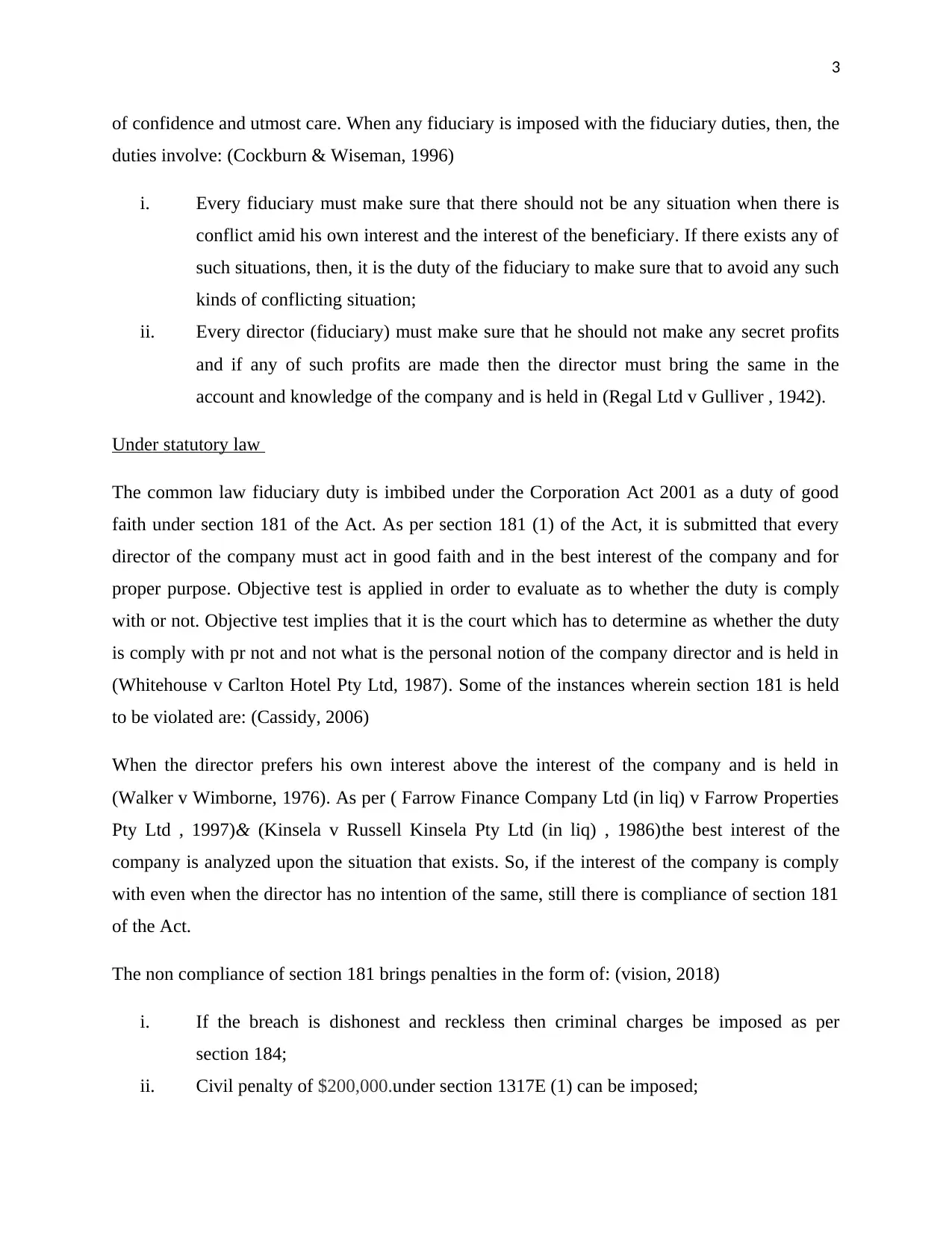
3
of confidence and utmost care. When any fiduciary is imposed with the fiduciary duties, then, the
duties involve: (Cockburn & Wiseman, 1996)
i. Every fiduciary must make sure that there should not be any situation when there is
conflict amid his own interest and the interest of the beneficiary. If there exists any of
such situations, then, it is the duty of the fiduciary to make sure that to avoid any such
kinds of conflicting situation;
ii. Every director (fiduciary) must make sure that he should not make any secret profits
and if any of such profits are made then the director must bring the same in the
account and knowledge of the company and is held in (Regal Ltd v Gulliver , 1942).
Under statutory law
The common law fiduciary duty is imbibed under the Corporation Act 2001 as a duty of good
faith under section 181 of the Act. As per section 181 (1) of the Act, it is submitted that every
director of the company must act in good faith and in the best interest of the company and for
proper purpose. Objective test is applied in order to evaluate as to whether the duty is comply
with or not. Objective test implies that it is the court which has to determine as whether the duty
is comply with pr not and not what is the personal notion of the company director and is held in
(Whitehouse v Carlton Hotel Pty Ltd, 1987). Some of the instances wherein section 181 is held
to be violated are: (Cassidy, 2006)
When the director prefers his own interest above the interest of the company and is held in
(Walker v Wimborne, 1976). As per ( Farrow Finance Company Ltd (in liq) v Farrow Properties
Pty Ltd , 1997)& (Kinsela v Russell Kinsela Pty Ltd (in liq) , 1986)the best interest of the
company is analyzed upon the situation that exists. So, if the interest of the company is comply
with even when the director has no intention of the same, still there is compliance of section 181
of the Act.
The non compliance of section 181 brings penalties in the form of: (vision, 2018)
i. If the breach is dishonest and reckless then criminal charges be imposed as per
section 184;
ii. Civil penalty of $200,000.under section 1317E (1) can be imposed;
of confidence and utmost care. When any fiduciary is imposed with the fiduciary duties, then, the
duties involve: (Cockburn & Wiseman, 1996)
i. Every fiduciary must make sure that there should not be any situation when there is
conflict amid his own interest and the interest of the beneficiary. If there exists any of
such situations, then, it is the duty of the fiduciary to make sure that to avoid any such
kinds of conflicting situation;
ii. Every director (fiduciary) must make sure that he should not make any secret profits
and if any of such profits are made then the director must bring the same in the
account and knowledge of the company and is held in (Regal Ltd v Gulliver , 1942).
Under statutory law
The common law fiduciary duty is imbibed under the Corporation Act 2001 as a duty of good
faith under section 181 of the Act. As per section 181 (1) of the Act, it is submitted that every
director of the company must act in good faith and in the best interest of the company and for
proper purpose. Objective test is applied in order to evaluate as to whether the duty is comply
with or not. Objective test implies that it is the court which has to determine as whether the duty
is comply with pr not and not what is the personal notion of the company director and is held in
(Whitehouse v Carlton Hotel Pty Ltd, 1987). Some of the instances wherein section 181 is held
to be violated are: (Cassidy, 2006)
When the director prefers his own interest above the interest of the company and is held in
(Walker v Wimborne, 1976). As per ( Farrow Finance Company Ltd (in liq) v Farrow Properties
Pty Ltd , 1997)& (Kinsela v Russell Kinsela Pty Ltd (in liq) , 1986)the best interest of the
company is analyzed upon the situation that exists. So, if the interest of the company is comply
with even when the director has no intention of the same, still there is compliance of section 181
of the Act.
The non compliance of section 181 brings penalties in the form of: (vision, 2018)
i. If the breach is dishonest and reckless then criminal charges be imposed as per
section 184;
ii. Civil penalty of $200,000.under section 1317E (1) can be imposed;
⊘ This is a preview!⊘
Do you want full access?
Subscribe today to unlock all pages.

Trusted by 1+ million students worldwide
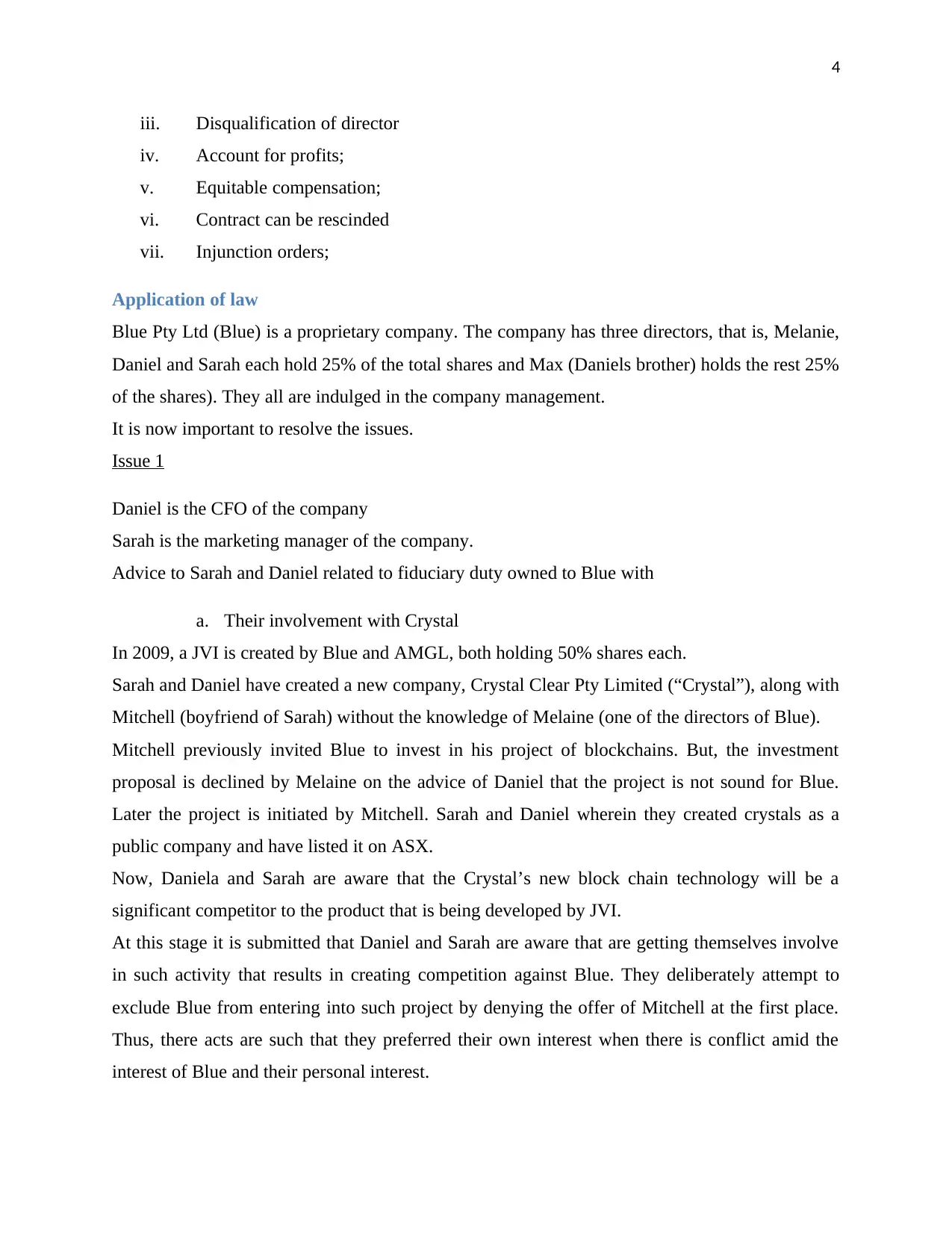
4
iii. Disqualification of director
iv. Account for profits;
v. Equitable compensation;
vi. Contract can be rescinded
vii. Injunction orders;
Application of law
Blue Pty Ltd (Blue) is a proprietary company. The company has three directors, that is, Melanie,
Daniel and Sarah each hold 25% of the total shares and Max (Daniels brother) holds the rest 25%
of the shares). They all are indulged in the company management.
It is now important to resolve the issues.
Issue 1
Daniel is the CFO of the company
Sarah is the marketing manager of the company.
Advice to Sarah and Daniel related to fiduciary duty owned to Blue with
a. Their involvement with Crystal
In 2009, a JVI is created by Blue and AMGL, both holding 50% shares each.
Sarah and Daniel have created a new company, Crystal Clear Pty Limited (“Crystal”), along with
Mitchell (boyfriend of Sarah) without the knowledge of Melaine (one of the directors of Blue).
Mitchell previously invited Blue to invest in his project of blockchains. But, the investment
proposal is declined by Melaine on the advice of Daniel that the project is not sound for Blue.
Later the project is initiated by Mitchell. Sarah and Daniel wherein they created crystals as a
public company and have listed it on ASX.
Now, Daniela and Sarah are aware that the Crystal’s new block chain technology will be a
significant competitor to the product that is being developed by JVI.
At this stage it is submitted that Daniel and Sarah are aware that are getting themselves involve
in such activity that results in creating competition against Blue. They deliberately attempt to
exclude Blue from entering into such project by denying the offer of Mitchell at the first place.
Thus, there acts are such that they preferred their own interest when there is conflict amid the
interest of Blue and their personal interest.
iii. Disqualification of director
iv. Account for profits;
v. Equitable compensation;
vi. Contract can be rescinded
vii. Injunction orders;
Application of law
Blue Pty Ltd (Blue) is a proprietary company. The company has three directors, that is, Melanie,
Daniel and Sarah each hold 25% of the total shares and Max (Daniels brother) holds the rest 25%
of the shares). They all are indulged in the company management.
It is now important to resolve the issues.
Issue 1
Daniel is the CFO of the company
Sarah is the marketing manager of the company.
Advice to Sarah and Daniel related to fiduciary duty owned to Blue with
a. Their involvement with Crystal
In 2009, a JVI is created by Blue and AMGL, both holding 50% shares each.
Sarah and Daniel have created a new company, Crystal Clear Pty Limited (“Crystal”), along with
Mitchell (boyfriend of Sarah) without the knowledge of Melaine (one of the directors of Blue).
Mitchell previously invited Blue to invest in his project of blockchains. But, the investment
proposal is declined by Melaine on the advice of Daniel that the project is not sound for Blue.
Later the project is initiated by Mitchell. Sarah and Daniel wherein they created crystals as a
public company and have listed it on ASX.
Now, Daniela and Sarah are aware that the Crystal’s new block chain technology will be a
significant competitor to the product that is being developed by JVI.
At this stage it is submitted that Daniel and Sarah are aware that are getting themselves involve
in such activity that results in creating competition against Blue. They deliberately attempt to
exclude Blue from entering into such project by denying the offer of Mitchell at the first place.
Thus, there acts are such that they preferred their own interest when there is conflict amid the
interest of Blue and their personal interest.
Paraphrase This Document
Need a fresh take? Get an instant paraphrase of this document with our AI Paraphraser
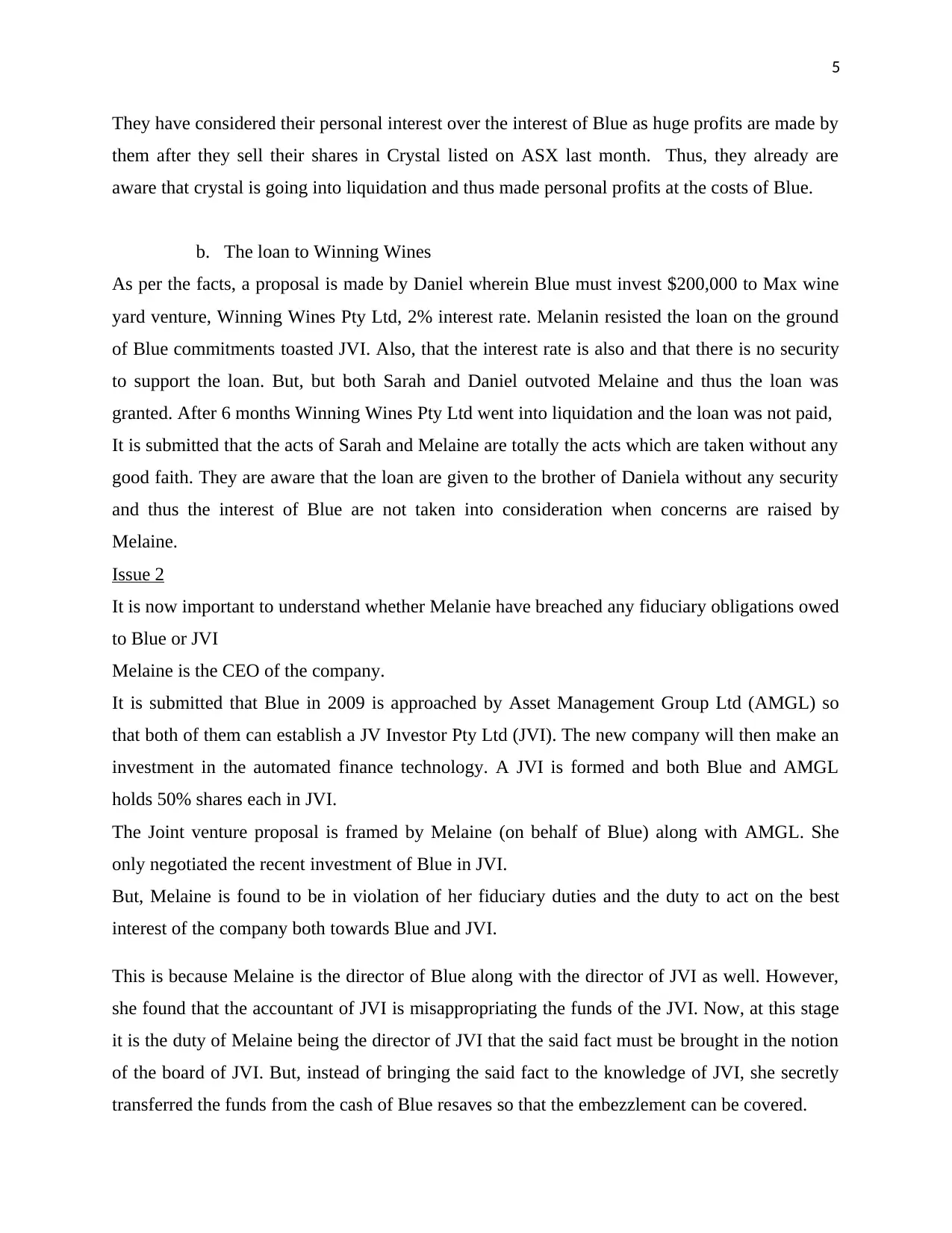
5
They have considered their personal interest over the interest of Blue as huge profits are made by
them after they sell their shares in Crystal listed on ASX last month. Thus, they already are
aware that crystal is going into liquidation and thus made personal profits at the costs of Blue.
b. The loan to Winning Wines
As per the facts, a proposal is made by Daniel wherein Blue must invest $200,000 to Max wine
yard venture, Winning Wines Pty Ltd, 2% interest rate. Melanin resisted the loan on the ground
of Blue commitments toasted JVI. Also, that the interest rate is also and that there is no security
to support the loan. But, but both Sarah and Daniel outvoted Melaine and thus the loan was
granted. After 6 months Winning Wines Pty Ltd went into liquidation and the loan was not paid,
It is submitted that the acts of Sarah and Melaine are totally the acts which are taken without any
good faith. They are aware that the loan are given to the brother of Daniela without any security
and thus the interest of Blue are not taken into consideration when concerns are raised by
Melaine.
Issue 2
It is now important to understand whether Melanie have breached any fiduciary obligations owed
to Blue or JVI
Melaine is the CEO of the company.
It is submitted that Blue in 2009 is approached by Asset Management Group Ltd (AMGL) so
that both of them can establish a JV Investor Pty Ltd (JVI). The new company will then make an
investment in the automated finance technology. A JVI is formed and both Blue and AMGL
holds 50% shares each in JVI.
The Joint venture proposal is framed by Melaine (on behalf of Blue) along with AMGL. She
only negotiated the recent investment of Blue in JVI.
But, Melaine is found to be in violation of her fiduciary duties and the duty to act on the best
interest of the company both towards Blue and JVI.
This is because Melaine is the director of Blue along with the director of JVI as well. However,
she found that the accountant of JVI is misappropriating the funds of the JVI. Now, at this stage
it is the duty of Melaine being the director of JVI that the said fact must be brought in the notion
of the board of JVI. But, instead of bringing the said fact to the knowledge of JVI, she secretly
transferred the funds from the cash of Blue resaves so that the embezzlement can be covered.
They have considered their personal interest over the interest of Blue as huge profits are made by
them after they sell their shares in Crystal listed on ASX last month. Thus, they already are
aware that crystal is going into liquidation and thus made personal profits at the costs of Blue.
b. The loan to Winning Wines
As per the facts, a proposal is made by Daniel wherein Blue must invest $200,000 to Max wine
yard venture, Winning Wines Pty Ltd, 2% interest rate. Melanin resisted the loan on the ground
of Blue commitments toasted JVI. Also, that the interest rate is also and that there is no security
to support the loan. But, but both Sarah and Daniel outvoted Melaine and thus the loan was
granted. After 6 months Winning Wines Pty Ltd went into liquidation and the loan was not paid,
It is submitted that the acts of Sarah and Melaine are totally the acts which are taken without any
good faith. They are aware that the loan are given to the brother of Daniela without any security
and thus the interest of Blue are not taken into consideration when concerns are raised by
Melaine.
Issue 2
It is now important to understand whether Melanie have breached any fiduciary obligations owed
to Blue or JVI
Melaine is the CEO of the company.
It is submitted that Blue in 2009 is approached by Asset Management Group Ltd (AMGL) so
that both of them can establish a JV Investor Pty Ltd (JVI). The new company will then make an
investment in the automated finance technology. A JVI is formed and both Blue and AMGL
holds 50% shares each in JVI.
The Joint venture proposal is framed by Melaine (on behalf of Blue) along with AMGL. She
only negotiated the recent investment of Blue in JVI.
But, Melaine is found to be in violation of her fiduciary duties and the duty to act on the best
interest of the company both towards Blue and JVI.
This is because Melaine is the director of Blue along with the director of JVI as well. However,
she found that the accountant of JVI is misappropriating the funds of the JVI. Now, at this stage
it is the duty of Melaine being the director of JVI that the said fact must be brought in the notion
of the board of JVI. But, instead of bringing the said fact to the knowledge of JVI, she secretly
transferred the funds from the cash of Blue resaves so that the embezzlement can be covered.
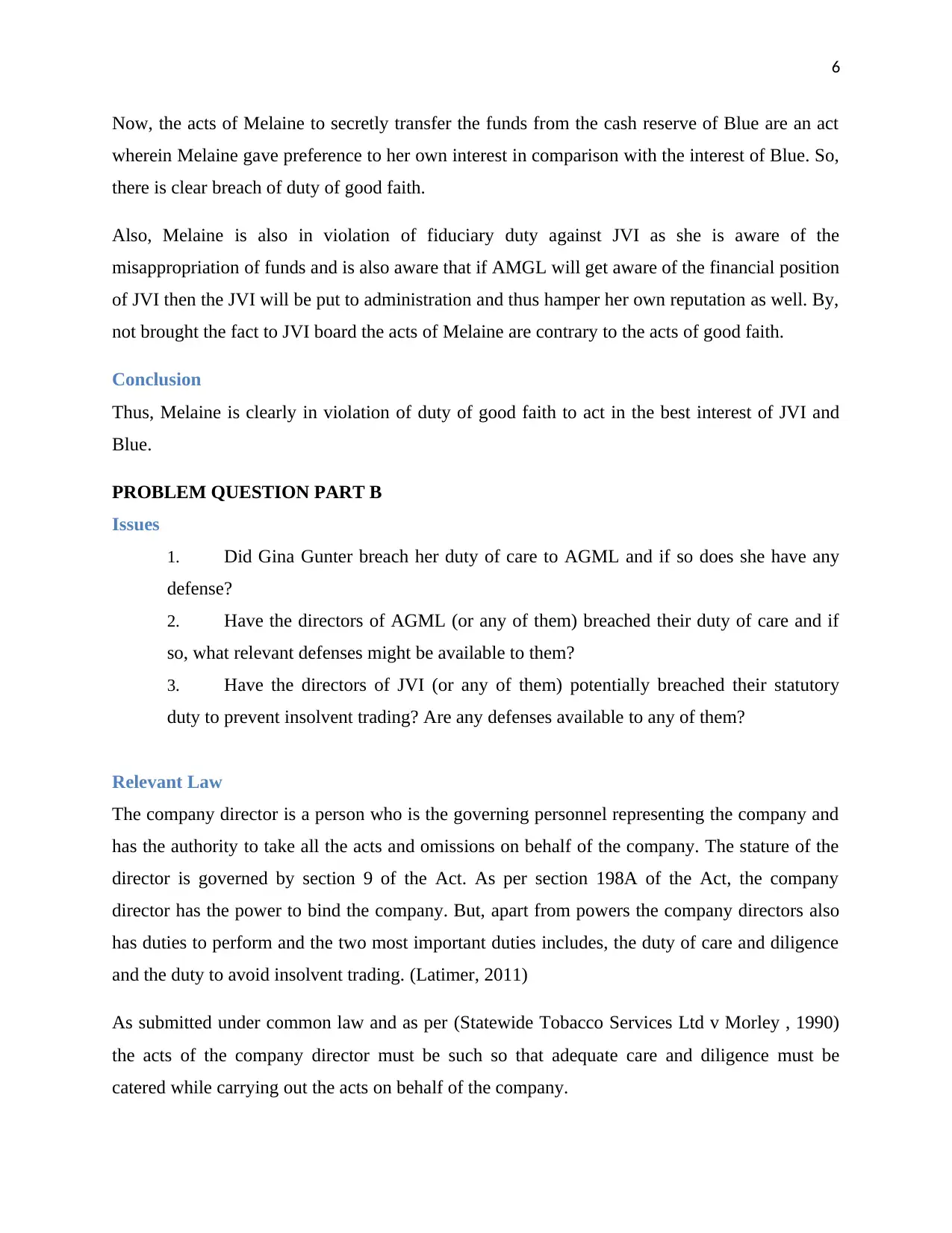
6
Now, the acts of Melaine to secretly transfer the funds from the cash reserve of Blue are an act
wherein Melaine gave preference to her own interest in comparison with the interest of Blue. So,
there is clear breach of duty of good faith.
Also, Melaine is also in violation of fiduciary duty against JVI as she is aware of the
misappropriation of funds and is also aware that if AMGL will get aware of the financial position
of JVI then the JVI will be put to administration and thus hamper her own reputation as well. By,
not brought the fact to JVI board the acts of Melaine are contrary to the acts of good faith.
Conclusion
Thus, Melaine is clearly in violation of duty of good faith to act in the best interest of JVI and
Blue.
PROBLEM QUESTION PART B
Issues
1. Did Gina Gunter breach her duty of care to AGML and if so does she have any
defense?
2. Have the directors of AGML (or any of them) breached their duty of care and if
so, what relevant defenses might be available to them?
3. Have the directors of JVI (or any of them) potentially breached their statutory
duty to prevent insolvent trading? Are any defenses available to any of them?
Relevant Law
The company director is a person who is the governing personnel representing the company and
has the authority to take all the acts and omissions on behalf of the company. The stature of the
director is governed by section 9 of the Act. As per section 198A of the Act, the company
director has the power to bind the company. But, apart from powers the company directors also
has duties to perform and the two most important duties includes, the duty of care and diligence
and the duty to avoid insolvent trading. (Latimer, 2011)
As submitted under common law and as per (Statewide Tobacco Services Ltd v Morley , 1990)
the acts of the company director must be such so that adequate care and diligence must be
catered while carrying out the acts on behalf of the company.
Now, the acts of Melaine to secretly transfer the funds from the cash reserve of Blue are an act
wherein Melaine gave preference to her own interest in comparison with the interest of Blue. So,
there is clear breach of duty of good faith.
Also, Melaine is also in violation of fiduciary duty against JVI as she is aware of the
misappropriation of funds and is also aware that if AMGL will get aware of the financial position
of JVI then the JVI will be put to administration and thus hamper her own reputation as well. By,
not brought the fact to JVI board the acts of Melaine are contrary to the acts of good faith.
Conclusion
Thus, Melaine is clearly in violation of duty of good faith to act in the best interest of JVI and
Blue.
PROBLEM QUESTION PART B
Issues
1. Did Gina Gunter breach her duty of care to AGML and if so does she have any
defense?
2. Have the directors of AGML (or any of them) breached their duty of care and if
so, what relevant defenses might be available to them?
3. Have the directors of JVI (or any of them) potentially breached their statutory
duty to prevent insolvent trading? Are any defenses available to any of them?
Relevant Law
The company director is a person who is the governing personnel representing the company and
has the authority to take all the acts and omissions on behalf of the company. The stature of the
director is governed by section 9 of the Act. As per section 198A of the Act, the company
director has the power to bind the company. But, apart from powers the company directors also
has duties to perform and the two most important duties includes, the duty of care and diligence
and the duty to avoid insolvent trading. (Latimer, 2011)
As submitted under common law and as per (Statewide Tobacco Services Ltd v Morley , 1990)
the acts of the company director must be such so that adequate care and diligence must be
catered while carrying out the acts on behalf of the company.
⊘ This is a preview!⊘
Do you want full access?
Subscribe today to unlock all pages.

Trusted by 1+ million students worldwide
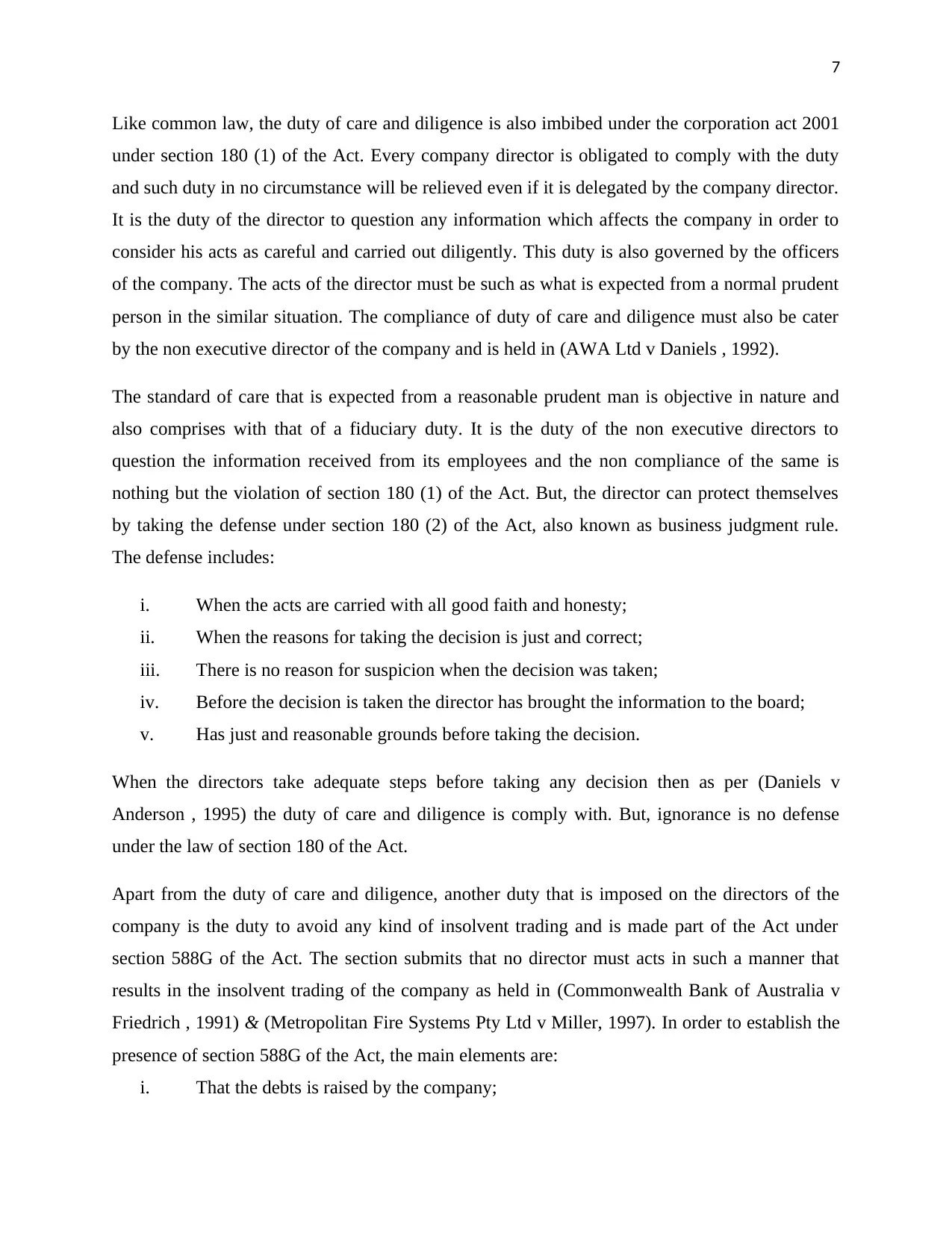
7
Like common law, the duty of care and diligence is also imbibed under the corporation act 2001
under section 180 (1) of the Act. Every company director is obligated to comply with the duty
and such duty in no circumstance will be relieved even if it is delegated by the company director.
It is the duty of the director to question any information which affects the company in order to
consider his acts as careful and carried out diligently. This duty is also governed by the officers
of the company. The acts of the director must be such as what is expected from a normal prudent
person in the similar situation. The compliance of duty of care and diligence must also be cater
by the non executive director of the company and is held in (AWA Ltd v Daniels , 1992).
The standard of care that is expected from a reasonable prudent man is objective in nature and
also comprises with that of a fiduciary duty. It is the duty of the non executive directors to
question the information received from its employees and the non compliance of the same is
nothing but the violation of section 180 (1) of the Act. But, the director can protect themselves
by taking the defense under section 180 (2) of the Act, also known as business judgment rule.
The defense includes:
i. When the acts are carried with all good faith and honesty;
ii. When the reasons for taking the decision is just and correct;
iii. There is no reason for suspicion when the decision was taken;
iv. Before the decision is taken the director has brought the information to the board;
v. Has just and reasonable grounds before taking the decision.
When the directors take adequate steps before taking any decision then as per (Daniels v
Anderson , 1995) the duty of care and diligence is comply with. But, ignorance is no defense
under the law of section 180 of the Act.
Apart from the duty of care and diligence, another duty that is imposed on the directors of the
company is the duty to avoid any kind of insolvent trading and is made part of the Act under
section 588G of the Act. The section submits that no director must acts in such a manner that
results in the insolvent trading of the company as held in (Commonwealth Bank of Australia v
Friedrich , 1991) & (Metropolitan Fire Systems Pty Ltd v Miller, 1997). In order to establish the
presence of section 588G of the Act, the main elements are:
i. That the debts is raised by the company;
Like common law, the duty of care and diligence is also imbibed under the corporation act 2001
under section 180 (1) of the Act. Every company director is obligated to comply with the duty
and such duty in no circumstance will be relieved even if it is delegated by the company director.
It is the duty of the director to question any information which affects the company in order to
consider his acts as careful and carried out diligently. This duty is also governed by the officers
of the company. The acts of the director must be such as what is expected from a normal prudent
person in the similar situation. The compliance of duty of care and diligence must also be cater
by the non executive director of the company and is held in (AWA Ltd v Daniels , 1992).
The standard of care that is expected from a reasonable prudent man is objective in nature and
also comprises with that of a fiduciary duty. It is the duty of the non executive directors to
question the information received from its employees and the non compliance of the same is
nothing but the violation of section 180 (1) of the Act. But, the director can protect themselves
by taking the defense under section 180 (2) of the Act, also known as business judgment rule.
The defense includes:
i. When the acts are carried with all good faith and honesty;
ii. When the reasons for taking the decision is just and correct;
iii. There is no reason for suspicion when the decision was taken;
iv. Before the decision is taken the director has brought the information to the board;
v. Has just and reasonable grounds before taking the decision.
When the directors take adequate steps before taking any decision then as per (Daniels v
Anderson , 1995) the duty of care and diligence is comply with. But, ignorance is no defense
under the law of section 180 of the Act.
Apart from the duty of care and diligence, another duty that is imposed on the directors of the
company is the duty to avoid any kind of insolvent trading and is made part of the Act under
section 588G of the Act. The section submits that no director must acts in such a manner that
results in the insolvent trading of the company as held in (Commonwealth Bank of Australia v
Friedrich , 1991) & (Metropolitan Fire Systems Pty Ltd v Miller, 1997). In order to establish the
presence of section 588G of the Act, the main elements are:
i. That the debts is raised by the company;
Paraphrase This Document
Need a fresh take? Get an instant paraphrase of this document with our AI Paraphraser
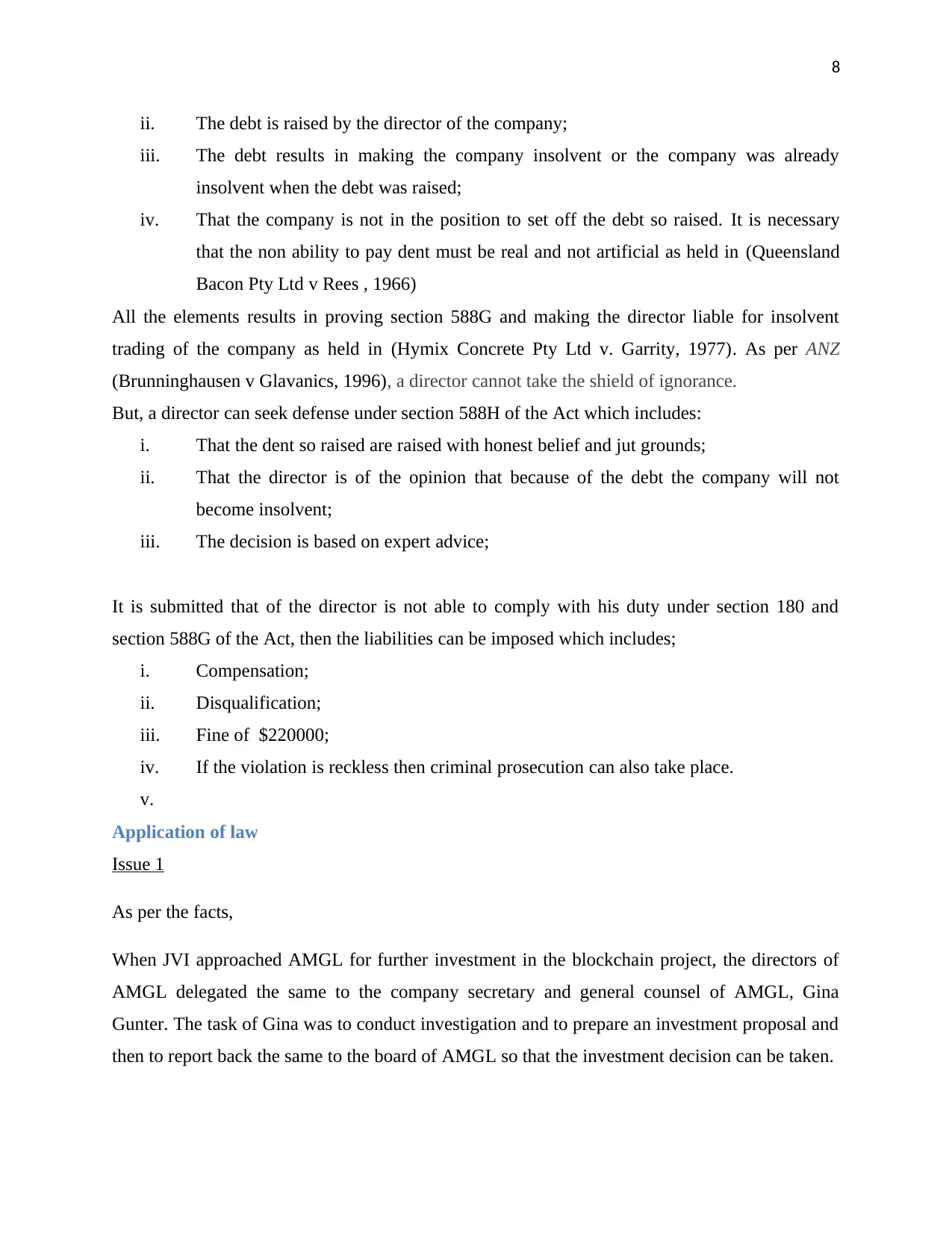
8
ii. The debt is raised by the director of the company;
iii. The debt results in making the company insolvent or the company was already
insolvent when the debt was raised;
iv. That the company is not in the position to set off the debt so raised. It is necessary
that the non ability to pay dent must be real and not artificial as held in (Queensland
Bacon Pty Ltd v Rees , 1966)
All the elements results in proving section 588G and making the director liable for insolvent
trading of the company as held in (Hymix Concrete Pty Ltd v. Garrity, 1977). As per ANZ
(Brunninghausen v Glavanics, 1996), a director cannot take the shield of ignorance.
But, a director can seek defense under section 588H of the Act which includes:
i. That the dent so raised are raised with honest belief and jut grounds;
ii. That the director is of the opinion that because of the debt the company will not
become insolvent;
iii. The decision is based on expert advice;
It is submitted that of the director is not able to comply with his duty under section 180 and
section 588G of the Act, then the liabilities can be imposed which includes;
i. Compensation;
ii. Disqualification;
iii. Fine of $220000;
iv. If the violation is reckless then criminal prosecution can also take place.
v.
Application of law
Issue 1
As per the facts,
When JVI approached AMGL for further investment in the blockchain project, the directors of
AMGL delegated the same to the company secretary and general counsel of AMGL, Gina
Gunter. The task of Gina was to conduct investigation and to prepare an investment proposal and
then to report back the same to the board of AMGL so that the investment decision can be taken.
ii. The debt is raised by the director of the company;
iii. The debt results in making the company insolvent or the company was already
insolvent when the debt was raised;
iv. That the company is not in the position to set off the debt so raised. It is necessary
that the non ability to pay dent must be real and not artificial as held in (Queensland
Bacon Pty Ltd v Rees , 1966)
All the elements results in proving section 588G and making the director liable for insolvent
trading of the company as held in (Hymix Concrete Pty Ltd v. Garrity, 1977). As per ANZ
(Brunninghausen v Glavanics, 1996), a director cannot take the shield of ignorance.
But, a director can seek defense under section 588H of the Act which includes:
i. That the dent so raised are raised with honest belief and jut grounds;
ii. That the director is of the opinion that because of the debt the company will not
become insolvent;
iii. The decision is based on expert advice;
It is submitted that of the director is not able to comply with his duty under section 180 and
section 588G of the Act, then the liabilities can be imposed which includes;
i. Compensation;
ii. Disqualification;
iii. Fine of $220000;
iv. If the violation is reckless then criminal prosecution can also take place.
v.
Application of law
Issue 1
As per the facts,
When JVI approached AMGL for further investment in the blockchain project, the directors of
AMGL delegated the same to the company secretary and general counsel of AMGL, Gina
Gunter. The task of Gina was to conduct investigation and to prepare an investment proposal and
then to report back the same to the board of AMGL so that the investment decision can be taken.
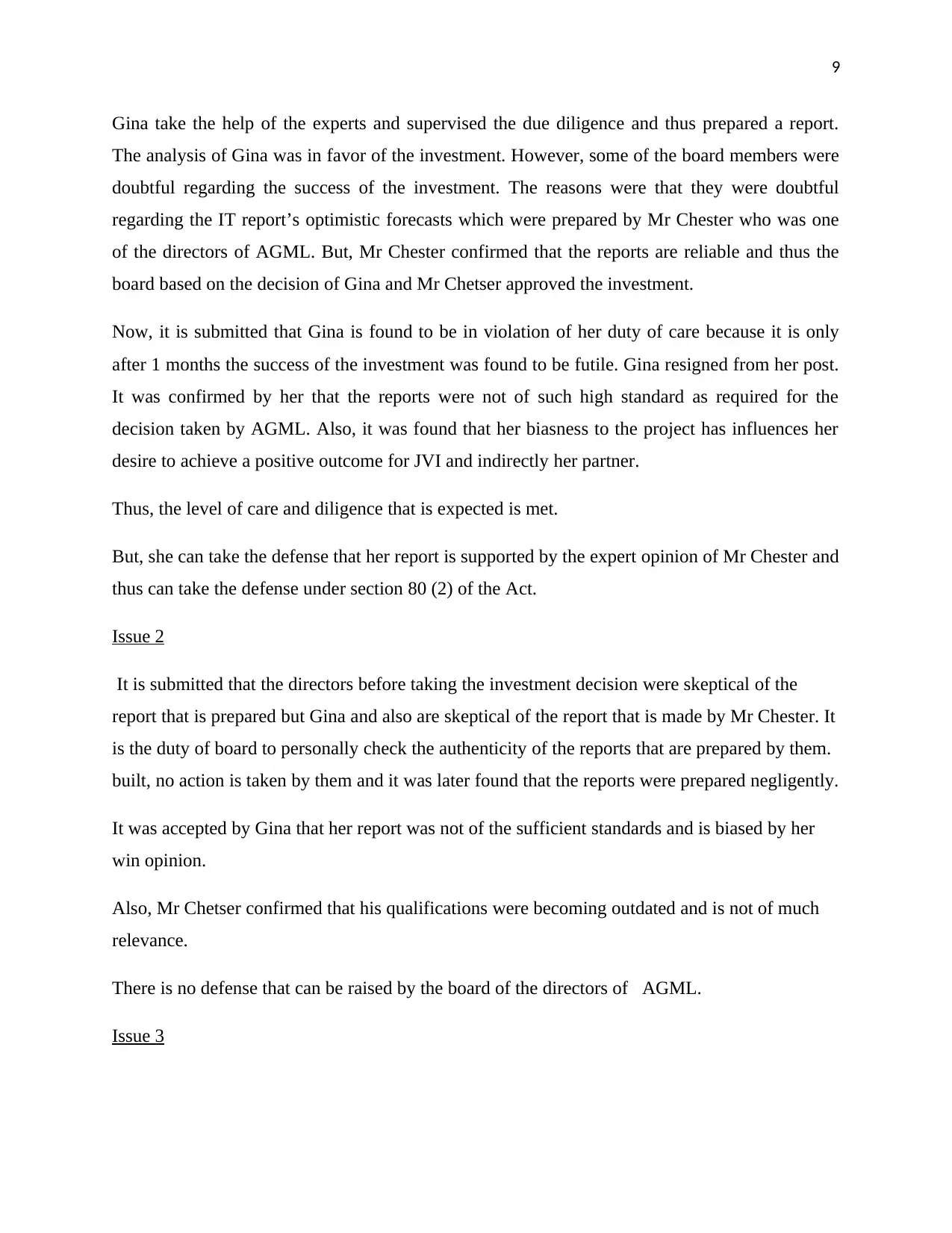
9
Gina take the help of the experts and supervised the due diligence and thus prepared a report.
The analysis of Gina was in favor of the investment. However, some of the board members were
doubtful regarding the success of the investment. The reasons were that they were doubtful
regarding the IT report’s optimistic forecasts which were prepared by Mr Chester who was one
of the directors of AGML. But, Mr Chester confirmed that the reports are reliable and thus the
board based on the decision of Gina and Mr Chetser approved the investment.
Now, it is submitted that Gina is found to be in violation of her duty of care because it is only
after 1 months the success of the investment was found to be futile. Gina resigned from her post.
It was confirmed by her that the reports were not of such high standard as required for the
decision taken by AGML. Also, it was found that her biasness to the project has influences her
desire to achieve a positive outcome for JVI and indirectly her partner.
Thus, the level of care and diligence that is expected is met.
But, she can take the defense that her report is supported by the expert opinion of Mr Chester and
thus can take the defense under section 80 (2) of the Act.
Issue 2
It is submitted that the directors before taking the investment decision were skeptical of the
report that is prepared but Gina and also are skeptical of the report that is made by Mr Chester. It
is the duty of board to personally check the authenticity of the reports that are prepared by them.
built, no action is taken by them and it was later found that the reports were prepared negligently.
It was accepted by Gina that her report was not of the sufficient standards and is biased by her
win opinion.
Also, Mr Chetser confirmed that his qualifications were becoming outdated and is not of much
relevance.
There is no defense that can be raised by the board of the directors of AGML.
Issue 3
Gina take the help of the experts and supervised the due diligence and thus prepared a report.
The analysis of Gina was in favor of the investment. However, some of the board members were
doubtful regarding the success of the investment. The reasons were that they were doubtful
regarding the IT report’s optimistic forecasts which were prepared by Mr Chester who was one
of the directors of AGML. But, Mr Chester confirmed that the reports are reliable and thus the
board based on the decision of Gina and Mr Chetser approved the investment.
Now, it is submitted that Gina is found to be in violation of her duty of care because it is only
after 1 months the success of the investment was found to be futile. Gina resigned from her post.
It was confirmed by her that the reports were not of such high standard as required for the
decision taken by AGML. Also, it was found that her biasness to the project has influences her
desire to achieve a positive outcome for JVI and indirectly her partner.
Thus, the level of care and diligence that is expected is met.
But, she can take the defense that her report is supported by the expert opinion of Mr Chester and
thus can take the defense under section 80 (2) of the Act.
Issue 2
It is submitted that the directors before taking the investment decision were skeptical of the
report that is prepared but Gina and also are skeptical of the report that is made by Mr Chester. It
is the duty of board to personally check the authenticity of the reports that are prepared by them.
built, no action is taken by them and it was later found that the reports were prepared negligently.
It was accepted by Gina that her report was not of the sufficient standards and is biased by her
win opinion.
Also, Mr Chetser confirmed that his qualifications were becoming outdated and is not of much
relevance.
There is no defense that can be raised by the board of the directors of AGML.
Issue 3
⊘ This is a preview!⊘
Do you want full access?
Subscribe today to unlock all pages.

Trusted by 1+ million students worldwide
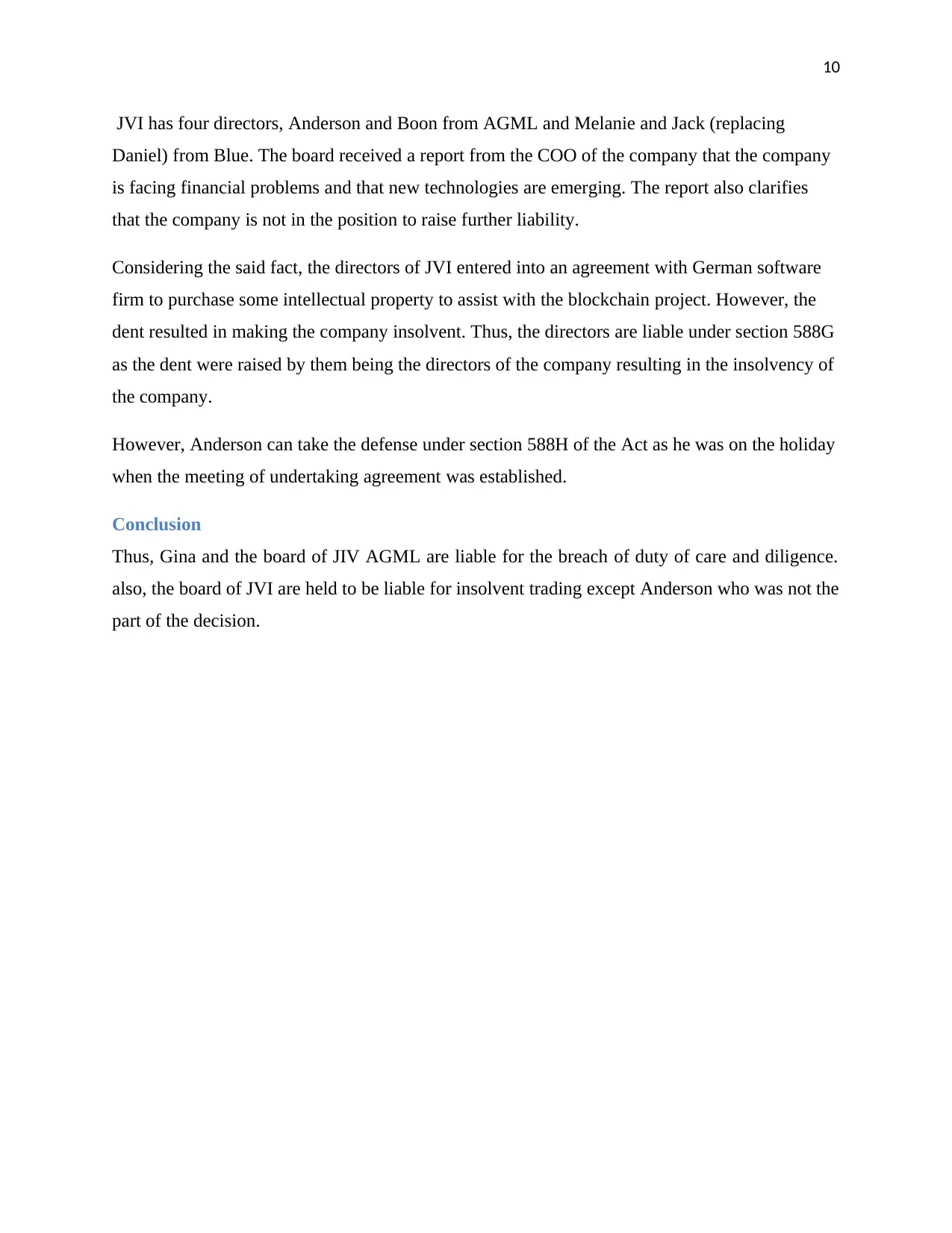
10
JVI has four directors, Anderson and Boon from AGML and Melanie and Jack (replacing
Daniel) from Blue. The board received a report from the COO of the company that the company
is facing financial problems and that new technologies are emerging. The report also clarifies
that the company is not in the position to raise further liability.
Considering the said fact, the directors of JVI entered into an agreement with German software
firm to purchase some intellectual property to assist with the blockchain project. However, the
dent resulted in making the company insolvent. Thus, the directors are liable under section 588G
as the dent were raised by them being the directors of the company resulting in the insolvency of
the company.
However, Anderson can take the defense under section 588H of the Act as he was on the holiday
when the meeting of undertaking agreement was established.
Conclusion
Thus, Gina and the board of JIV AGML are liable for the breach of duty of care and diligence.
also, the board of JVI are held to be liable for insolvent trading except Anderson who was not the
part of the decision.
JVI has four directors, Anderson and Boon from AGML and Melanie and Jack (replacing
Daniel) from Blue. The board received a report from the COO of the company that the company
is facing financial problems and that new technologies are emerging. The report also clarifies
that the company is not in the position to raise further liability.
Considering the said fact, the directors of JVI entered into an agreement with German software
firm to purchase some intellectual property to assist with the blockchain project. However, the
dent resulted in making the company insolvent. Thus, the directors are liable under section 588G
as the dent were raised by them being the directors of the company resulting in the insolvency of
the company.
However, Anderson can take the defense under section 588H of the Act as he was on the holiday
when the meeting of undertaking agreement was established.
Conclusion
Thus, Gina and the board of JIV AGML are liable for the breach of duty of care and diligence.
also, the board of JVI are held to be liable for insolvent trading except Anderson who was not the
part of the decision.
Paraphrase This Document
Need a fresh take? Get an instant paraphrase of this document with our AI Paraphraser
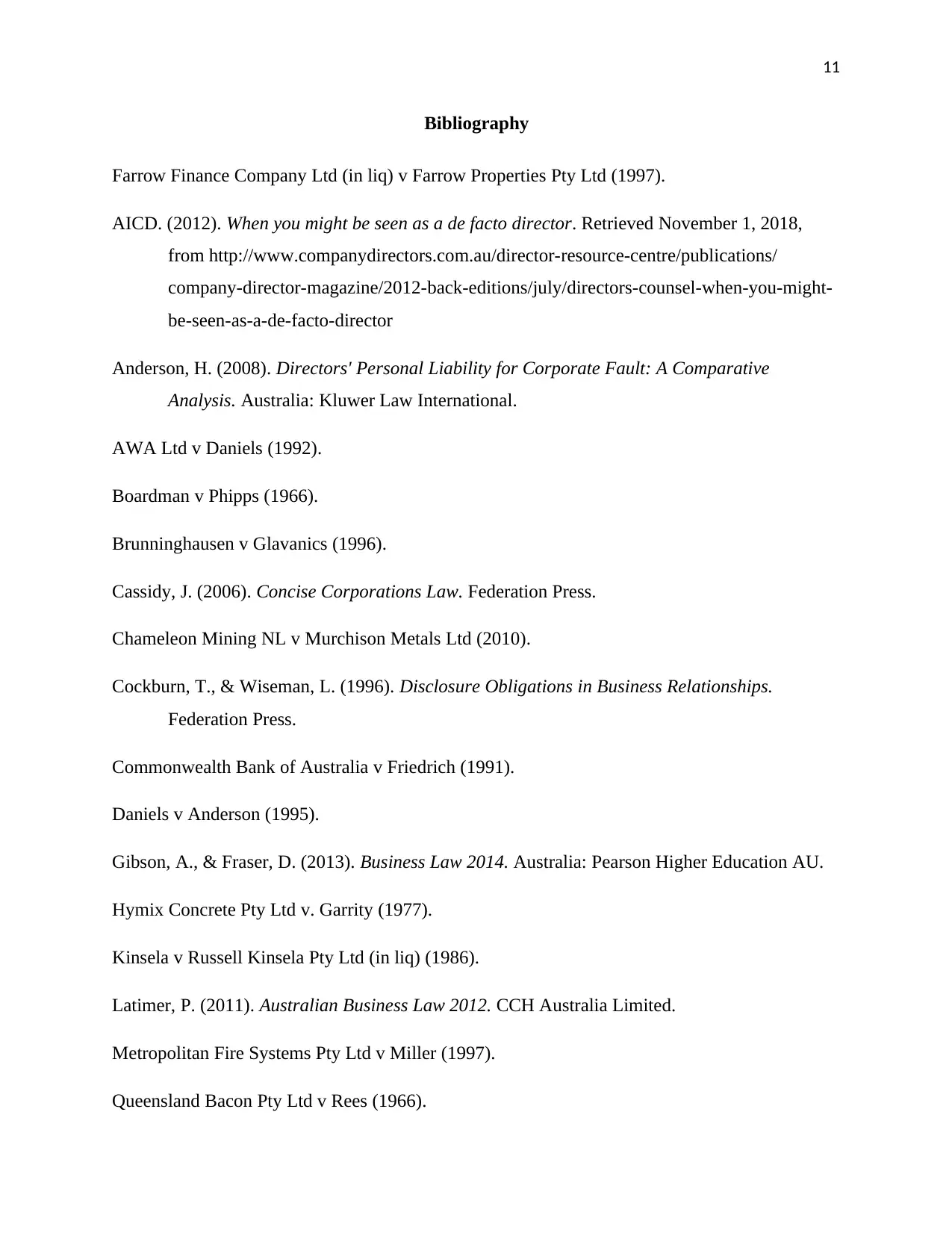
11
Bibliography
Farrow Finance Company Ltd (in liq) v Farrow Properties Pty Ltd (1997).
AICD. (2012). When you might be seen as a de facto director. Retrieved November 1, 2018,
from http://www.companydirectors.com.au/director-resource-centre/publications/
company-director-magazine/2012-back-editions/july/directors-counsel-when-you-might-
be-seen-as-a-de-facto-director
Anderson, H. (2008). Directors' Personal Liability for Corporate Fault: A Comparative
Analysis. Australia: Kluwer Law International.
AWA Ltd v Daniels (1992).
Boardman v Phipps (1966).
Brunninghausen v Glavanics (1996).
Cassidy, J. (2006). Concise Corporations Law. Federation Press.
Chameleon Mining NL v Murchison Metals Ltd (2010).
Cockburn, T., & Wiseman, L. (1996). Disclosure Obligations in Business Relationships.
Federation Press.
Commonwealth Bank of Australia v Friedrich (1991).
Daniels v Anderson (1995).
Gibson, A., & Fraser, D. (2013). Business Law 2014. Australia: Pearson Higher Education AU.
Hymix Concrete Pty Ltd v. Garrity (1977).
Kinsela v Russell Kinsela Pty Ltd (in liq) (1986).
Latimer, P. (2011). Australian Business Law 2012. CCH Australia Limited.
Metropolitan Fire Systems Pty Ltd v Miller (1997).
Queensland Bacon Pty Ltd v Rees (1966).
Bibliography
Farrow Finance Company Ltd (in liq) v Farrow Properties Pty Ltd (1997).
AICD. (2012). When you might be seen as a de facto director. Retrieved November 1, 2018,
from http://www.companydirectors.com.au/director-resource-centre/publications/
company-director-magazine/2012-back-editions/july/directors-counsel-when-you-might-
be-seen-as-a-de-facto-director
Anderson, H. (2008). Directors' Personal Liability for Corporate Fault: A Comparative
Analysis. Australia: Kluwer Law International.
AWA Ltd v Daniels (1992).
Boardman v Phipps (1966).
Brunninghausen v Glavanics (1996).
Cassidy, J. (2006). Concise Corporations Law. Federation Press.
Chameleon Mining NL v Murchison Metals Ltd (2010).
Cockburn, T., & Wiseman, L. (1996). Disclosure Obligations in Business Relationships.
Federation Press.
Commonwealth Bank of Australia v Friedrich (1991).
Daniels v Anderson (1995).
Gibson, A., & Fraser, D. (2013). Business Law 2014. Australia: Pearson Higher Education AU.
Hymix Concrete Pty Ltd v. Garrity (1977).
Kinsela v Russell Kinsela Pty Ltd (in liq) (1986).
Latimer, P. (2011). Australian Business Law 2012. CCH Australia Limited.
Metropolitan Fire Systems Pty Ltd v Miller (1997).
Queensland Bacon Pty Ltd v Rees (1966).
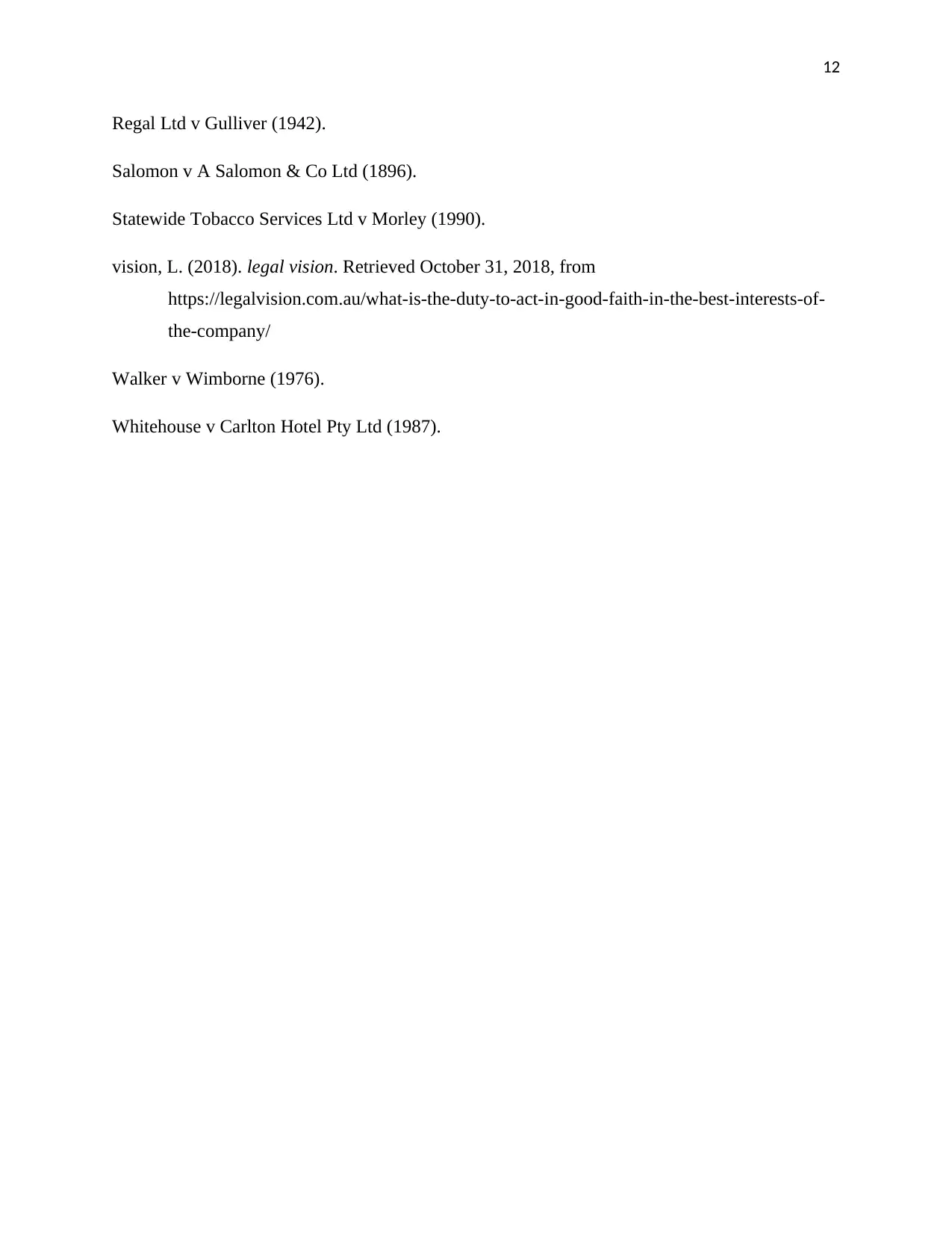
12
Regal Ltd v Gulliver (1942).
Salomon v A Salomon & Co Ltd (1896).
Statewide Tobacco Services Ltd v Morley (1990).
vision, L. (2018). legal vision. Retrieved October 31, 2018, from
https://legalvision.com.au/what-is-the-duty-to-act-in-good-faith-in-the-best-interests-of-
the-company/
Walker v Wimborne (1976).
Whitehouse v Carlton Hotel Pty Ltd (1987).
Regal Ltd v Gulliver (1942).
Salomon v A Salomon & Co Ltd (1896).
Statewide Tobacco Services Ltd v Morley (1990).
vision, L. (2018). legal vision. Retrieved October 31, 2018, from
https://legalvision.com.au/what-is-the-duty-to-act-in-good-faith-in-the-best-interests-of-
the-company/
Walker v Wimborne (1976).
Whitehouse v Carlton Hotel Pty Ltd (1987).
⊘ This is a preview!⊘
Do you want full access?
Subscribe today to unlock all pages.

Trusted by 1+ million students worldwide
1 out of 12
Related Documents
Your All-in-One AI-Powered Toolkit for Academic Success.
+13062052269
info@desklib.com
Available 24*7 on WhatsApp / Email
![[object Object]](/_next/static/media/star-bottom.7253800d.svg)
Unlock your academic potential
Copyright © 2020–2026 A2Z Services. All Rights Reserved. Developed and managed by ZUCOL.





